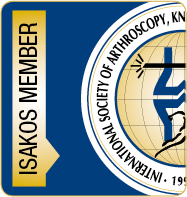The hip joint is a ball-and-socket joint that connects the thigh bone (femur) to the pelvic bone. The hip joint is composed of two main parts: the acetabulum, which is a concave socket on the pelvis, and the femoral head, which is the rounded ball at the top of the thigh bone. It is one of the largest and most stable joints in the human body, and it allows for a wide range of movement, including flexion, extension, abduction, adduction, internal rotation, and external rotation.
Osteoarthritis
Osteoarthritis is a condition that commonly affects the hip joint. It is due to the loss of cartilage within the joint due to wear and tear, which results in inflammation and pain. While arthritis in its early stages can be managed without surgery, when the symptoms worsen, Total Hip Replacement is a very successful operation in alleviating pain and restoring function.
Dr Balendra who is a specialist hip surgeon Sydney who performs Robotic Total Hip replacements to ensure that his patients get the best possible outcome from surgery.
Avascular Necrosis
Avascular Necrosis (AVN) is a condition that affects the femoral head (top of the thigh bone). Due to a wide range of causes, including but not limited to steroids, excessive alcohol intake, deep sea diving and blood disorders, the blood supply to the femoral head is compromised, which leads to collapse of the femoral head.
If you have developed Avascular Necrosis in your hips, you should see a specialist hip surgeon, so that they can advise you on the best treatment forwards. There are joint preserving operations that may have a role in the early stages of AVN, but if its developed significantly then a Total Hip Replacement is usually the surgery of choice.
Childhood (Paediatric) Hip Conditions
Paediatric Hip conditions are a common childhood problem. They include Developmental Dysplasia of the Hip, Legg-Calve-Perthes disease and Slipped Capital Femoral Epiphysis (SCFE). Unfortunately, if you had one of these conditions as a child, you would likely have ongoing problems with your hip in your adulthood. If you start to develop severe pain or restriction in function in your hip, then your should seek advice from a specialist hip surgeon. Advances in surgery mean that there may be a surgical solution to help you with your symptoms.
Gluteal Bursitis
Gluteal bursitis is a condition characterized by inflammation and irritation of the bursa, which is a small fluid-filled sac located between the gluteus maximus muscle and the greater trochanter (a bony prominence on the upper part of the thigh bone). The bursa acts as a cushion and reduces friction between the muscles, tendons, and bones in the hip joint. When it becomes inflamed, it can cause pain and discomfort in the hip, buttock, and thigh.
Gluteal bursitis can be caused by repetitive overuse or trauma to the hip, such as prolonged sitting, running, or climbing stairs. It can also be caused by underlying conditions such as osteoarthritis.
Treatment for gluteal bursitis usually involves rest and anti-inflammatory medication to reduce pain and swelling. Physiotherapy is also recommended to strengthen the muscles around the hip joint and improve mobility. In some cases, corticosteroid injections may be used to reduce inflammation and pain. Surgery is rarely needed but may be an option in severe cases.
Proximal Hamstrings Tear
Proximal hamstring tears are common sports-related injuries. They occur during sports or activities such as running, hurdling, water-skiing, and kicking. These tears can be debilitating and can lead to pain and weakness in the affected leg without surgical repair. It is important to seek advice urgently from a Hip specialist, and Dr Balendra has urgent appointments available for patients with proximal hamstrings tears.



